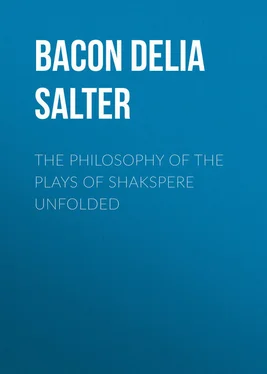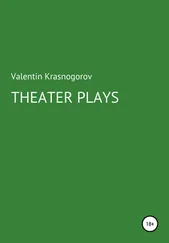Delia Bacon - The Philosophy of the Plays of Shakspere Unfolded
Здесь есть возможность читать онлайн «Delia Bacon - The Philosophy of the Plays of Shakspere Unfolded» — ознакомительный отрывок электронной книги совершенно бесплатно, а после прочтения отрывка купить полную версию. В некоторых случаях можно слушать аудио, скачать через торрент в формате fb2 и присутствует краткое содержание. Жанр: literature_19, foreign_antique, foreign_prose, на английском языке. Описание произведения, (предисловие) а так же отзывы посетителей доступны на портале библиотеки ЛибКат.
- Название:The Philosophy of the Plays of Shakspere Unfolded
- Автор:
- Жанр:
- Год:неизвестен
- ISBN:нет данных
- Рейтинг книги:3 / 5. Голосов: 1
-
Избранное:Добавить в избранное
- Отзывы:
-
Ваша оценка:
- 60
- 1
- 2
- 3
- 4
- 5
The Philosophy of the Plays of Shakspere Unfolded: краткое содержание, описание и аннотация
Предлагаем к чтению аннотацию, описание, краткое содержание или предисловие (зависит от того, что написал сам автор книги «The Philosophy of the Plays of Shakspere Unfolded»). Если вы не нашли необходимую информацию о книге — напишите в комментариях, мы постараемся отыскать её.
The Philosophy of the Plays of Shakspere Unfolded — читать онлайн ознакомительный отрывок
Ниже представлен текст книги, разбитый по страницам. Система сохранения места последней прочитанной страницы, позволяет с удобством читать онлайн бесплатно книгу «The Philosophy of the Plays of Shakspere Unfolded», без необходимости каждый раз заново искать на чём Вы остановились. Поставьте закладку, и сможете в любой момент перейти на страницу, на которой закончили чтение.
Интервал:
Закладка:
This was the learning in which the art of a new age and race first spoke, and many an old foolish, childish, borrowed notion went off like vapour in it at its first word, without any one's ever so much as stopping to observe it, any one whose place was within. It is the school of a criticism much more severe than the criticism which calls its freedom in question. It is a school in which the taking of names in vain in general is strictly forbidden. That is the first commandment of it, and it is a commandment with promise.
The man who sits there in the Tower, now, driving that same 'goose-pen' which he speaks of as such a safe instrument for unfolding practical doctrines, with such patient energy, is not now occupied with the statistics of Noah's Ark, grave as he looks; though that, too, is a subject which his nautical experience and the indomitable bias of his genius as a western man towards calculation in general, together with his notion that the affairs of the world generally, past as well as future, belong properly to his sphere as a man , will require him to take up and examine and report upon, before he will think that his work is done. It is not a chapter in the History of the World which he is composing at present, though that work is there at this moment on the table, and forms the ostensible state-prison work of this convict.
This is the man who made one so long ago in those brilliant 'Round Table' reunions, in which the idea of converting the new belles lettres of that new time, to such grave and politic uses was first suggested; he is the genius of that company, that even in such frolic mad-cap games as Love's Labour's Lost, and the Taming of the Shrew, and Midsummer Night's Dream, could contrive to insert, not the broad farce and burlesque on the old pretentious wordy philosophy and pompous rhetoric it was meant to dethrone only, and not the most perilous secret of the new philosophy, only, but the secret of its organ of delivery and tradition, the secret of its use of letters, the secret of its ' cipher in letters ,' and not its 'cipher in words' only, the cipher in which the secret of the authorship of these works was infolded, and in which it was found , but not found in these earlier plays, – plays in which these so perilous secrets are still conveyed in so many involutions, in passages so intricate with quips and puns and worthless trivialities, so uninviting or so marred with their superficial meanings, that no one would think of looking in them for anything of any value. For it is always when some necessary, but not superficial, question of the play is to be considered, that the Clown and the Fool are most in request, for 'there be of them that will themselves laugh to set on some barren spectators to laugh too'; and under cover of that mirth it is, that the grave or witty undertone reaches the ear of the judicious.
It is in the later and more finished works of this school that the key to the secret doctrines of it, which it is the object of this work to furnish, is best found. But the fact, that in the very rudest and most faulty plays in this collection of plays, which form so important a department of the works of this school, which make indeed the noblest tradition, the only adequate tradition, the 'illustrated tradition' of its noblest doctrine – the fact that in the very earliest germ of this new union of 'practic and theoric,' of art and learning, from which we pluck at last Advancements of Learning, and Hamlets, and Lears, and Tempests, and the Novum Organum, already the perilous secret of this union is infolded, already the entire organism that these great fruits and flowers will unfold in such perfection is contained, and clearly traceable, – this is a fact which appeared to require insertion in this history, and not, perhaps, without some illustration.
'It is not amiss to observe,' says the Author of the Advancement of Learning, when at last his great exordium to the science of nature in man, and the art of culture and cure that is based on that science is finished – pausing to observe it, pausing ere he will produce his index to that science, to observe it: 'It is not amiss to observe', he says – (speaking of the operation of culture in general on young minds, so forcible, though unseen, as hardly any length of time, or contention of labour, can countervail it afterwards) – 'how small and mean faculties gotten by education, yet when they fall into great men, or great matters , do work great and important effects ; whereof we see a notable example in Tacitus , of two stage-players , Percennius and Vibulenus, who, by their faculty of playing , put the Pannonian armies into an extreme tumult and combustion ; for, there arising a mutiny among them, upon the death of Augustus Caesar, Blaesus the lieutenant had committed some of the mutineers, which were suddenly rescued ; whereupon Vibulenus got to be heard speak [being a stage-player], which he did in this manner .
'"These poor innocent wretches appointed to cruel death , you have restored to behold the light: but who shall restore my brother to me, or life to my brother, that was sent hither in message from the legions of Germany to treat of – THE COMMON CAUSE? And he hath murdered him this last night by some of his fencers and ruffians, that he hath about him for his executioners upon soldiers. The mortalest enemies do not deny burial; when I have performed my last duties to the corpse with kisses, with tears, command me to be slain besides him , so that these, my fellows, for our good meaning and our true hearts to THE LEGION, may have leave to bury us ."
'With which speech he put the army into an infinite fury and uproar; whereas, truth was, he had no brother, neither was there any such matter [in that case], but he played it merely as if he had been upon the stage.'
This is the philosopher and stage critic who expresses a decided opinion elsewhere, that 'the play's the thing,' though he finds this kind of writing, too, useful in its way, and for certain purposes; but he is the one who, in speaking of the original differences in the natures and gifts of men, suggests that 'there are a kind of men who can, as it were, divide themselves;' and he does not hesitate to propound it as his deliberate opinion, that a man of wit should have at command a number of styles adapted to different auditors and exigencies; that is, if he expects to accomplish anything with his rhetoric. That is what he makes himself responsible for from his professional chair of learning; but it is the Prince of Denmark, with his remarkable natural faculty of speaking to the point, who says, ' Seneca can not be too heavy , nor Plautus too light, for – [what?] – the law of writ – and – the liberty .' ' These are the only men ,' he adds, referring apparently to that tinselled gauded group of servants that stand there awaiting his orders.
'My lord – you played once in the university , you say,' he observes afterwards, addressing himself to that so politic statesmen whose overreaching court plots and performances end for himself so disastrously. 'That did I, my lord,' replies Polonius, ' and was accounted a good actor .' 'And what did you enact?' 'I did enact Julius Caesar . I – was killed i' the Capitol [I]. Brutus killed me.' 'It was a brute part of him [collateral sounds – Elizabethan phonography] to kill so capitol a calf there. – Be the players ready?'(?). [That is the question.]
'While watching the progress of the action at Sadlers' Wells,' says the dramatic critic of the 'Times,' in the criticism of the Comedy of Errors before referred to, directing attention to the juvenile air of the piece, to 'the classic severity in the form of the play,' and 'that baldness of treatment which is a peculiarity of antique comedy' – 'while watching the progress of the action at Sadlers' Wells, we may almost fancy we are at St. Peter's College , witnessing the annual performance of the Queen's scholars .' That is not surprising to one acquainted with the history of these plays, though the criticism which involves this kind of observation is not exactly the criticism to which we have been accustomed here. But any one who wishes to see, as a matter of antiquarian curiosity, or for any other purpose, how far from being hampered in the first efforts of his genius with this class of educational associations, that particular individual would naturally have been, in whose unconscious brains this department of the modern learning is supposed to have had its accidental origin, – any one who wishes to see in what direction the antecedents of a person in that station in life would naturally have biased, at that time , his first literary efforts, if, indeed, he had ever so far escaped from the control of circumstances as to master the art of the collocation of letters – any person who has any curiosity whatever on this point is recommended to read in this connection a letter from a professional contemporary of this individual – one who comes to us with unquestionable claims to our respect, inasmuch as he appears to have had some care for the future , and some object in living beyond that of promoting his own immediate private interests and sensuous gratification.
Читать дальшеИнтервал:
Закладка:
Похожие книги на «The Philosophy of the Plays of Shakspere Unfolded»
Представляем Вашему вниманию похожие книги на «The Philosophy of the Plays of Shakspere Unfolded» списком для выбора. Мы отобрали схожую по названию и смыслу литературу в надежде предоставить читателям больше вариантов отыскать новые, интересные, ещё непрочитанные произведения.
Обсуждение, отзывы о книге «The Philosophy of the Plays of Shakspere Unfolded» и просто собственные мнения читателей. Оставьте ваши комментарии, напишите, что Вы думаете о произведении, его смысле или главных героях. Укажите что конкретно понравилось, а что нет, и почему Вы так считаете.












